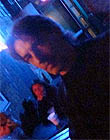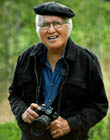|
|
This topic comprises 3 pages: 1 2 3
|
|
Author
|
Topic: Digital is Boring.
|
Randy Stankey
Film God

Posts: 6539
From: Erie, Pennsylvania
Registered: Jun 99
|
 posted 04-17-2014 09:16 PM
posted 04-17-2014 09:16 PM




I like photography and I like movies.
I like computers and digital imagery is kind of cool but, I'm sorry to say, digital is just... boring.
Digital cool in its own way but I like my film better.
A lot of people in my camera club seem to think that, because I don't use digital cameras that I CAN'T use them. When I start talking Photoshop and digital printing, some people look at me as if I'm not "supposed" to know how. The fact is that I can do digital as well as any and better than many.
If there wasn't any film and digital is all there was, I probably wouldn't be interested in movies or photography.
I don't mean like digital replaced film. I mean that film never existed and all that existed was digital. As a kid, when I first learned about photography, I probably would never had more than a passing interest and I probably wouldn't be a photographer or a movie technician today.
I like working with my hands, using machines and film to make images. We can debate about whether film or digital involves more or less work. Honestly, I think it's a trade-off. Even if it is more work to operate a film projector, it is more fulfilling to me.
Digital image quality is great but, as good as it is, it often looks "synthetic" to me. I like the visual qualities of film. It looks natural.
If movie theaters never had film projectors and DCP is all there ever was, I don't think I would have ever worked in a movie theater.
Digital is boring. It just doesn't make my "light bulb" turn on.
I think I'll go downstairs to my darkroom and print some photos, now...
| IP: Logged
|
|
|
|
|
|
|
|
|
|
Leo Enticknap
Film God

Posts: 7474
From: Loma Linda, CA
Registered: Jul 2000
|
 posted 04-18-2014 01:23 AM
posted 04-18-2014 01:23 AM





quote: Randy Stankey
I tell people who shoot digital that they should take just one summer and shoot nothing but film. Even if they don't shoot film, ever again, I guarantee that their photography skills will grow by orders of magnitude.
It's the way consumer technologies tend to go, isn't it? As it becomes more refined, the level of theoretical skill and applied knowledge needed to use it diminishes; or at least, it certainly changes. Those who learnt "the hard way" then tend to think that the later generations are missing something because an aspect of the process that previously had to be done by a human is now automated.
Another example: I learnt to drive in a car that not only had a manual transmission, but didn't even have synchromesh (you had to double-declutch when changing gears). I never drove an automatic regularly until I moved to the US, and still don't like the loss of control with it deciding when to change gears, not me. My wife, who has always owned and driven automatic cars, thinks that I'm just showing off and that automatics are a good thing because they enable you to concentrate more on the traffic and less on mechanical control processes. If we have children, Google's self-driving vehicles will probably be commonplace by the time they're learning to drive, and by the time they're my age, maintaining manual control of the speed and direction of the vehicle on a routine journey will possibly be a thing of the past.
Likewise, for those of us who learnt to take photos on film, without automatic focus, shutter speed and aperture, the level of automation in a D-SLR is disconcerting. I still don't like having to go through a menu system to set them manually. But for those who started to learn "serious" photography post-film, the cameras I started with must seem something like I'd have felt if, aged in my mid-teens, I'd been confronted with the challenge of making a Daguerrotype.
| IP: Logged
|
|
|
|
Steve Moore
Expert Film Handler

Posts: 211
From: Leeds, West Yorks, UK
Registered: Apr 2008
|
 posted 04-18-2014 06:04 AM
posted 04-18-2014 06:04 AM




Are digital cameras any less annoying than they were 10 years ago? I'm no great photo expert but used to take a lot of photos on the several different film cameras I owned and we had a small dark room for processing B&W
When i bought my canon 350D, no matter what settings I set it to (trying to replicate what I did on 35mm film for years before hand) my issue always was the fact the camera still appeared to try adjust some setting to compensate for either a dark or light area of the image. Irrespective of any adjustment If there was a light area in the photo (say some sunny sky) the foreground was dark and lost any detail or if the bulk of the shot was dark it would try make it brighter and then over expose any brighter parts.
For me that was the best advantage of film - it seemed to react to contrast and light levels far better than digital - every "pixel" (for want of a better word) of real film reacted in it's own way to the light hitting it.
After fighting with my, then new, digital camera I sort of lost interest in taking photos, and though I still use it, have never been happy. I suppose I should buy a newer model, perhaps!
I'm with Randy, though - if it was not for the spinning reels and mechanical aspect of projectors, 26 years ago when I started as a projectionist in cinemas (and 8 years earlier still with super 8 and 16mm at home) I probably would have never gotten into it at all.
| IP: Logged
|
|
Ken Lackner
Phenomenal Film Handler

Posts: 1907
From: Atlanta, GA, USA
Registered: Sep 2001
|
 posted 04-18-2014 08:44 AM
posted 04-18-2014 08:44 AM




I both agree and disagree with Randy. I probably wouldn't have started in this industry if film never existed. It is fascinating. Operating and repairing moving machinery is fascinating. I'm glad I still have 8 screens of 35mm to take care of. If digital was all there ever was, I probably would have still popped popcorn all those summers ago in high school, but I don't know that I would have taken an interest in the booth and be where I'm at today.
Photography, on the other hand, is different for me. Now, don't get me wrong. Film still is fascinating, and superior in quality. But that's if you're making prints. Who makes prints any more? I'm a concert photographer. It's not uncommon for me to snap upwards of 200 shots of the first three songs of a show, and only 25 images make the cut. How much waste would there be if I were shooting on film? I would have to be a lot more selective in what I shoot, which could possibly mean missing the opportunity to get that one perfect shot. I truly believe that if there were no digital and film was all there was, I wouldn't be doing what I do.
That being said, I do wish I had the opportunity to learn on film. In a way, I feel like I "cheated" in getting to where I'm at today. But I am glad digital exists, as it suits my purpose perfectly. YMMV.
| IP: Logged
|
|
|
|
Bobby Henderson
"Ask me about Trajan."

Posts: 10973
From: Lawton, OK, USA
Registered: Apr 2001
|
 posted 04-18-2014 10:16 AM
posted 04-18-2014 10:16 AM




quote: Leo Enticknap
It's the way consumer technologies tend to go, isn't it? As it becomes more refined, the level of theoretical skill and applied knowledge needed to use it diminishes; or at least, it certainly changes. Those who learnt "the hard way" then tend to think that the later generations are missing something because an aspect of the process that previously had to be done by a human is now automated.
Film forces any photographer to shoot with some level of discipline. He has to think a little about what he's going to shoot before he takes the shot. With digital, most people shoot the picture, look at the results on the LCD screen and then say, "that didn't look right, let me take another one." This especially goes for all those people using an iPhone or something like it as their camera. They don't learn what they need to learn in order to get the shot right in the first place. So they end up taking a lot of shit photos and missing the best shots because they're approaching the photography craft in a random manner.
Here's one exercise digital camera users can try: don't look at any of the photos on the LCD display until after the photography work is done. Anyone who knows how to set his camera up properly for the scene being photographed won't need to peep at photos on the LCD screen. With film, you didn't get to see your results until after the roll of film was developed.
quote: Leo Enticknap
Likewise, for those of us who learnt to take photos on film, without automatic focus, shutter speed and aperture, the level of automation in a D-SLR is disconcerting. I still don't like having to go through a menu system to set them manually.
The "auto" functions in even the best cameras often get things wrong. I rarely ever have the dial on my camera set to anything other than "M" (manual). If I do use an auto function it would either be aperture priority or shutter priority. I never use the full auto function. My lenses have good auto focus capabilities, but they also have manual override.
quote: Steve Moore
For me that was the best advantage of film - it seemed to react to contrast and light levels far better than digital - every "pixel" (for want of a better word) of real film reacted in it's own way to the light hitting it.
The quality (and size) of the image sensor plays a tremendous part in determining overall image quality. This is true for all digital cameras, even video cameras. Bigger sensors typically sport higher resolution, but they can also have much bigger pixel sizes. Bigger pixels on the sensor see color and contrast better. My 5D Mark II blows away the cameras I previously used, but it's easily outclassed by medium and large format digital cameras mainly over having even bigger image sensors. Smart phone cameras have some of the smallest image sensors (and smallest lenses too). So it's no accident their image quality often sucks.
quote: Ken Lackner
It's not uncommon for me to snap upwards of 200 shots of the first three songs of a show, and only 25 images make the cut. How much waste would there be if I were shooting on film?
For me that's the biggest advantage of digital. Not only do you have much greater capacity for images, you're not having to swap out rolls of film constantly. You can just keep shooting. It takes me awhile to fill up an 8GB compact flash card, even shooting in RAW.
| IP: Logged
|
|
|
|
Bobby Henderson
"Ask me about Trajan."

Posts: 10973
From: Lawton, OK, USA
Registered: Apr 2001
|
 posted 04-18-2014 10:25 AM
posted 04-18-2014 10:25 AM




quote: Randy Stankey
If I have important shots, I can have them developed and printed in a few hours if I hustle but, today, event photographers are under even more time pressure than that. People just want to see their wedding photos or their concert shots 0.68 seconds after the shutter clicks. I find it weird.
If I was shooting a wedding I wouldn't let people bother me wanting to see photos on the LCD display until after the most important stuff was finished.
Anyone photographing a news-worthy event is under great pressure to get the shots uploaded to news agencies ASAP. Some sports photographers will be feeding shots to a computer via WiFi transfer as they're being taken. An assistant does some minor tweaking and gets it uploaded maybe not even a minute or two after the big play. That approach and the pressure involved gives it some of the same feel as working on a live TV broadcast.
quote: Randy Stankey
Do you think that could be a factor in why we see so many crap movies being put out? There are still good movies but has the immediacy and the perception of ease in digital movie making allowed a flood of crap movies to hit the market which might not have even gotten off the ground if we were still using film?
Perhaps to a certain degree. Digital cameras certainly make some things easier, faster and cheaper. But other things have not changed, like lighting, production design, etc. It still takes the same amount of time to set up all that stuff.
It's possible to run and gun a bunch of a movie with DSLR cameras, but without all the other elements that add production value the end results are going to look very cheap and bad.
The thing I dislike the most about video-based movie cameras is the image quality. They have improved, but they're just not there yet in fully replicating the film look. Too often the film look filtering applied to the video footage degrades the image quality rather than improving it.
Digital's best advantage is the image capacity. For certain genres, comedy in particular, digital is pretty good. Actors can improv and experiment without anyone worrying about burning up too much film (or running out of film) during a take.
| IP: Logged
|
|
Ken Lackner
Phenomenal Film Handler

Posts: 1907
From: Atlanta, GA, USA
Registered: Sep 2001
|
 posted 04-18-2014 10:39 AM
posted 04-18-2014 10:39 AM




Bobby's example doesn't apply to my situation. But at a concert, the photographer has zero control over the lighting and subject. Sometimes, especially in cases where the lighting is rapidly changing, it is necessary to "machine gun" it. You could fire the shutter a dozen times in a three second period and get one usable shot. This is entirely different from shooting weddings, portraits, models, landscapes, etc. And while my photos don't have to be turned in immediately, most publications want them published by the following day or the day after at the latest. (Ideally, they want to be the first to publish photos of that event.)
Back to movies. I don't really care how the movie is shot. The film-vs-digital argument for me comes down to exhibition. Operating and servicing film projectors is what originally captured my interest, and I'm not sure digital projectors would have in the same way. That being said, I still thoroughly enjoy the craft.
| IP: Logged
|
|
|
|
|
|
All times are Central (GMT -6:00)
|
This topic comprises 3 pages: 1 2 3
|
Powered by Infopop Corporation
UBB.classicTM
6.3.1.2
The Film-Tech Forums are designed for various members related to the cinema industry to express their opinions, viewpoints and testimonials on various products, services and events based upon speculation, personal knowledge and factual information through use, therefore all views represented here allow no liability upon the publishers of this web site and the owners of said views assume no liability for any ill will resulting from these postings. The posts made here are for educational as well as entertainment purposes and as such anyone viewing this portion of the website must accept these views as statements of the author of that opinion
and agrees to release the authors from any and all liability.
|

 Home
Home
 Products
Products
 Store
Store
 Forum
Forum
 Warehouse
Warehouse
 Contact Us
Contact Us




 Printer-friendly view of this topic
Printer-friendly view of this topic








![[Smile]](smile.gif)

![[Razz]](tongue.gif)




![[Wink]](wink.gif)



